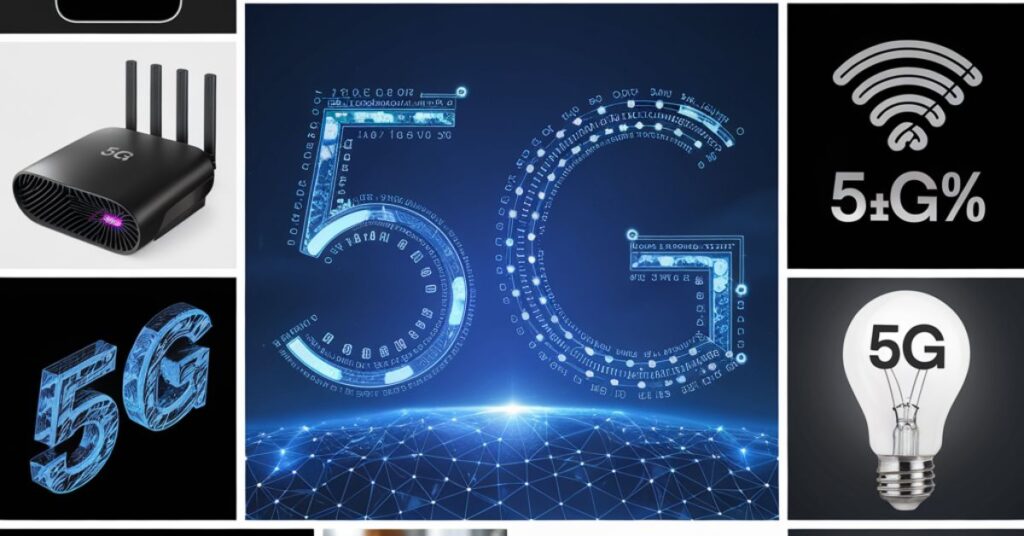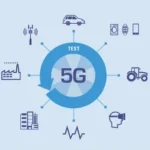5G technology is the latest advancement in mobile networks, offering faster speeds, lower latency, and the ability to connect more devices. It enhances user experiences with ultra-fast downloads, seamless video streaming, and support for advanced applications like virtual reality. Beyond entertainment, 5G powers innovations in smart cities, healthcare, and autonomous vehicles by enabling real-time data sharing.
However, adopting 5G also raises security challenges. Increased data flow and connected devices make networks more vulnerable to cyberattacks. To stay safe, phone providers must implement strong encryption and regular updates. For users, choosing a trusted data connectivity plan is key to enjoying 5G’s benefits while staying protected against risks.
What is 5G?
5G is the latest and fastest mobile network technology, following 4G LTE, which served most phones before. With faster speeds, lower latency, and greater bandwidth, 5G improves download and upload times and offers more reliable connectivity. This advancement supports high-speed activities like streaming, gaming, and powering smart devices, making it the natural evolution of mobile networks.
5G is more than just speed it’s a disruptive technology like AI or IoT. It transforms how we interact with the internet and powers innovations such as self-driving cars, virtual reality, and remote healthcare. However, 5G also brings security risks. To stay safe, providers must enhance encryption, and users should choose trusted networks and secure devices.
You May also Read this Blog: The Power of 5G: 5 Benefits That Will Transform Your Digital World
December 24, 2024
Why is 5G important?
5G is the latest generation of mobile broadband technology, bringing faster speeds and better connectivity. Unlike 4G LTE Wireless, which has low latency and good capacity for data, 5G significantly improves these features. This makes it ideal for advanced technologies like artificial intelligence (AI), the Internet of Things (IoT), and machine learning (ML). These systems need quick communication and lots of data handling, which 5G can deliver on a much larger scale than 4G.
Phone providers are key to making 5G accessible. They build the necessary infrastructure, like towers and networks, to offer reliable connections. With 5G, users experience smoother video calls, quicker downloads, and a stronger link between devices and the internet.
Advantages of 5G technology
5G brings several benefits that improve how we use technology. One of the main advantages is its smaller physical footprint, meaning 5G towers and equipment are smaller and more efficient compared to older technologies. This makes it easier to install and maintain, especially in crowded or urban areas.
Smaller Physical Footprint
- 5G uses less energy, requiring fewer cell towers.
- It is more efficient in providing coverage.
Reduced Error Rates
- The system reduces mistakes in data transmission.
- 5G improves the quality and reliability of the signal.
Better Bandwidth
- 5G offers more capacity to handle multiple devices.
- It supports faster data speeds.
Lower Latencies
- 5G minimises delays for faster response times.
- This is especially useful for real-time applications like gaming.
Intel Benefits with 5G
Intel plays a significant role in the development of 5G technology, offering several benefits to both businesses and consumers. With Intel’s powerful processors and 5G solutions, companies can improve their network efficiency, speed, and security. Intel’s products support faster data transmission, enabling smoother communication and better performance in various industries, from healthcare to manufacturing.
Key Benefits:
- Faster Processing: Intel’s processors support high-speed data handling.
- Improved Security: Intel helps strengthen network security against cyber threats.
- Scalability: Intel’s technology can easily handle growing network demands.
- Efficiency: reduces energy consumption while improving performance.
Intel’s contributions make 5G more accessible and reliable worldwide.
Disadvantages of 5G
While 5G offers many advantages, it also comes with some challenges. One of the main concerns is cybersecurity, as the increased number of connected devices creates more opportunities for hacking and data breaches. The complex nature of 5G networks also makes it harder to secure all connections effectively.
Cybersecurity & Network Slicing
- More connected devices can increase the risks of cyberattacks.
- Network slicing divides the network into smaller parts, which may cause vulnerabilities.
Infrastructure
- 5G requires new infrastructure, which can be expensive to build.
- Many areas may struggle with implementing this technology.
Gaps in Coverage
- 5G has uneven coverage in rural or remote areas.
- Some regions may not have access to 5G networks for years.
Penetration
- The signal may have difficulty penetrating buildings or obstacles.
- Higher frequencies can be blocked by walls and trees.
How does 5G technology work?
5G technology operates by using advanced radio waves and new communication standards to provide faster speeds and greater capacity. It improves upon the older 4G system, enabling more devices to connect with minimal delay. By using a combination of millimetre waves, small cells, and network slicing, 5G ensures faster and more reliable connections.
New Cellular Standard
- 5G offers a new framework for faster and more reliable networks.
- It increases data transfer speeds significantly compared to 4G.
Network Slicing
- Allows the creation of customised networks for different needs.
- Provides more efficient use of network resources.
Private Networks
- Businesses can set up secure and fast networks just for them.
- These networks are isolated from public internet traffic.
Embedded Systems
- 5G enables smart devices to function faster and more efficiently.
- Embedded systems in devices improve performance.
Cellular and Networking
- Combines cellular technology with improved network infrastructure.
- This creates a robust and efficient communication system.
Cellular Routers and Endpoint
- Cellular routers connect devices to the internet more reliably.
- Endpoints provide secure, fast connections for devices.
5G Use Cases
- Smart homes, autonomous cars, healthcare, and real-time gaming benefit from 5G’s low latency and high speed.
IBM and 5G
IBM is working with 5G technology to create innovative solutions for various industries. By combining its powerful computing systems with 5G’s fast network, IBM aims to improve data processing and connectivity. This collaboration allows businesses to analyse large amounts of data in real time, which helps in making better decisions and increasing efficiency.
IBM’s expertise in artificial intelligence (AI) and cloud computing is also helping to enhance 5G networks. With AI, 5G can be optimised to deliver faster speeds and more reliable connections. IBM’s involvement in 5G technology is changing how industries operate, from manufacturing to healthcare, by making them smarter and more connected.
What Is So Special About 5G?
5G is the fifth generation of mobile networks, offering faster internet speeds, lower latency, and better connectivity. It can handle more devices at once, making it ideal for the growing number of smart devices in homes and businesses. Unlike previous networks, 5G uses advanced technologies that allow for quicker and more reliable data transfer.
What makes 5G special is its ability to connect many devices with very low delays, making real-time communication easier. This improved speed and connection quality are expected to revolutionise areas like healthcare, transportation, and entertainment, providing users with smoother experiences and more opportunities for innovation.
Why Is 5G Better Than 4G?
5G is a significant upgrade over 4G because it offers faster speeds, lower latency, and better connectivity. With 5G, you can download files, stream videos, and play games much faster than with 4G. It allows multiple devices to connect at once without slowing down the network, making it ideal for crowded areas like stadiums or city centres.
Additionally, 5G reduces delays, meaning your actions will happen almost instantly, which is great for things like online gaming or video calls. It also supports new technologies such as self-driving cars and smart cities, opening up many exciting possibilities for the future.
More Benefits of 5G mmWave
5G mmWave technology offers several exciting advantages for users. It provides ultra-fast internet speeds, enabling faster downloads, smooth video streaming, and high-quality gaming experiences. With mmWave, users can enjoy seamless connections, even in busy areas, as it supports more devices without slowing down the network.
Additionally, mmWave helps improve connectivity in urban environments and remote areas by offering more reliable and higher-capacity networks. This technology allows for better performance in industries like healthcare, transportation, and manufacturing, enabling innovations like smart cities and connected vehicles. Overall, 5G mmWave promises to transform daily life with faster and more efficient communication.
Benefits of 5G For Businesses
5G technology offers significant advantages for businesses by enabling faster and more reliable communication. It allows companies to connect more devices, making it easier to gather data and improve operations. With faster internet speeds, businesses can enhance productivity, streamline processes, and improve customer experiences. The reduced latency ensures real-time decision-making, which is especially useful for industries like healthcare and finance.
Additionally, 5G can support innovations such as smart offices, autonomous vehicles, and advanced automation. By embracing 5G, businesses can stay competitive, adapt to changing markets, and improve efficiency, leading to long-term growth and success in a fast-paced digital world.
Test the Capabilities of 5G Technology with Digi
Digi offers a great way to test the full potential of 5G technology. With Digi’s 5G network, you can experience ultra-fast internet speeds, lower latency, and reliable connections. Whether you’re streaming high-definition videos, gaming online, or using smart devices, 5G provides the performance you need for a seamless experience.
By using Digi’s 5G services, you’ll discover how this next-generation network can improve everyday tasks. From faster downloads to more efficient communication, testing 5G with Digi shows how this technology can transform your online experience. Don’t miss out on exploring everything 5G has to offer!
FAQ’s
What is the full form of 5G?
5G stands for “Fifth Generation” of wireless technology.
Is 5G available in Pakistan?
Yes, 5G services have been launched in Pakistan, but availability is still expanding.
What is another name for 5G?
5G is also known as “fifth-generation wireless technology.
Who invented 5G?
5G was developed by various organisations, including the 3rd Generation Partnership Project (3GPP).
What is the speed of 5G?
5G speeds can reach up to 10 Gbps, much faster than previous generations like 4G.
Conclusion
5G technology brings a new era of connectivity, offering numerous benefits and features that can enhance both personal and business experiences. With its faster internet speeds, lower latency, and increased capacity, 5G opens up endless possibilities for streaming, gaming, and smart devices. It improves efficiency, enabling industries like healthcare, transportation, and manufacturing to thrive with innovations like remote surgeries and autonomous vehicles. Additionally, 5G provides a more reliable network, reducing error rates and improving overall performance.
As the world increasingly depends on digital solutions, 5G is set to become the backbone of future technologies. Its ability to handle more devices simultaneously, coupled with its advanced capabilities, will support the growing demands of an interconnected world. Testing and adopting 5G will unlock its full potential, making it a transformative force that will reshape how we live, work, and communicate, both today and in the years to come.







